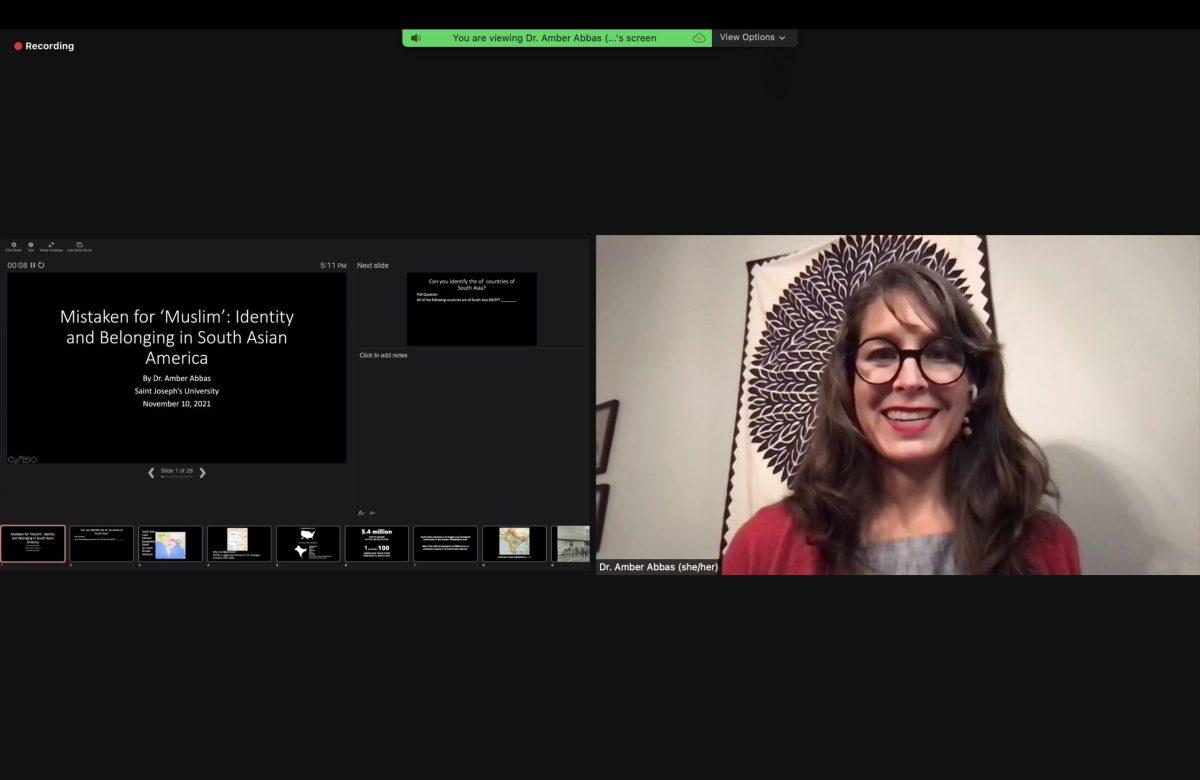Amber Abbas, Ph.D., associate professor of history, presented “Mistaken for ‘Muslim:’ Identity and Belonging in South Asian America,” a lecture exploring the identity and background of South Asians and their migration to the U.S.
The lecture took place on Nov. 10 on Zoom as part of the 2021 Diversity & Inclusion Faculty Signature Lecture Series. This lecture series, sponsored by the Center for Inclusion and Diversity (CID), highlights faculty working to promote diversity, equity and inclusion, either through research or inclusive teaching practices in the classroom.
In her lecture, Abbas gave an overview of the experiences many South Asian Americans face today since their migration to the U.S. beginning in the 1700s, but most notably during the late 1800s. These experiences include racial profiling and cultural generalization, Abbas said during the lecture.“The laying of a blanket of suspicion over all Muslims, or all people who might be identified truly or mistakenly as Muslims, to misidentify all of them as potential perpetrators is the job of Islamophobia,” Abbas said in an interview with The Hawk. “That’s the job of racism, to lump everybody together.”
Shishira Philip ’22, a first-generation Indian American, recounted experiencing cultural stereotypes and racism throughout middle school and high school.
“Back in middle school, I’d be walking with my friend, and these white boys would come up and be like, ‘Oh my God, do you smell that?’” Philip said. “And we’d be like, ‘what?’ And they’re like, ‘Oh, I think it’s your– Oh, it’s not a perfume. I think you smell like curry. It smells really bad.’”
Philip said she has also experienced people mistaking her religious identity, which was one of the main focuses of Abbas’ lecture.
“[People] have mistaken me for a Hindu,” Philip said. “I am Christian, they automatically assume that I’m not Christian. South Asians aren’t a monolith. If you do see someone [who may] have that heritage, don’t assume what they do and do not do.”
As a mixed-race South Asian American, Abbas said this lecture was deeply personal for her. Abbas said growing up in a household with a Muslim father from British India and being surrounded by family members from Pakistan allowed her to see the complexities of Muslim and South Asian identities.
“We expect a very orthodox, religious devotion from Muslims because, in general, we understand so little about Muslim life and its humanity,” Abbas said. “But I grew up in a household with somebody who very much was grounded in and came from Muslim culture and society.”
According to Abbas, the othering of and racism towards South Asians and Islamophobia only increased post-9/11.
“I was living in an environment where I was surrounded by people who couldn’t understand how much that experience meant to me personally,” Abbas said.
Vraj Thakar ’22, a first-generation Indian American, said his extended family faced discrimination after 9/11.
“I’ve had other extended family members face those types of issues, just like weird looks,” Thakar said. “I have a few family members that do wear turbans, and a lot of them felt very disrespected, or just hated, after 9/11.”
Abbas said there’s a need for representation within the South Asian communities, given the severe lack of understanding of their cultures.
“I often pass into white spaces undetected, and it takes work sometimes for me to draw out those aspects of my heritage and my identity,” Abbas said. “It’s always a joy to get to participate in efforts that help to raise the visibility of those communities, not just for my own benefit, but to draw attention to their presence here.”
Abbas also encouraged students to learn from, and participate in, new cultural events and experiences, whether that means attending on campus events or taking the train into Center City, Philadelphia.
“We benefit from the presence of a multiplicity of cultures in the United States, and that is an extraordinarily rare privilege,” Abbas said. “There are truly very few places in the world where you have that kind of complexity. I really want to encourage students and people in general to take advantage of it in the most positive way to use those resources to make connections.
Nicole R. Stokes, Ph.D., associate provost of Diversity, Equity and Inclusion, said the CID is currently arranging for more DEI speaker events during the spring 2022 semester.
“For the spring, we wanted to focus on global indicators of health and diversity and health care,” Stokes said. “We want to signal to our students about this issue of health and vaccination and wellness and how there are DEI determinants of how populations can have different access to health care, delivery and healthcare services.”



































